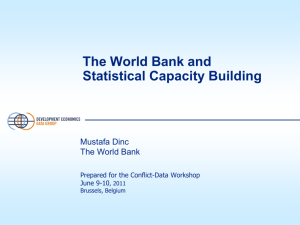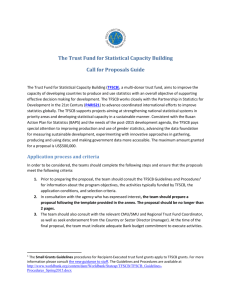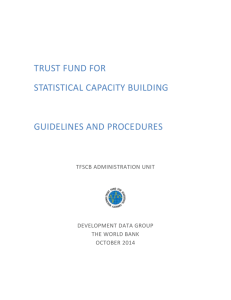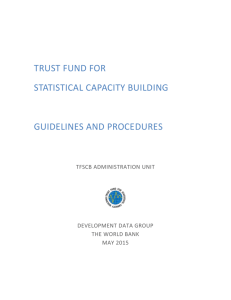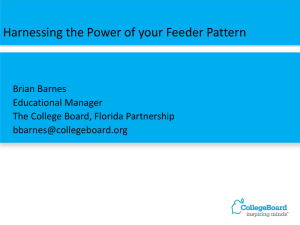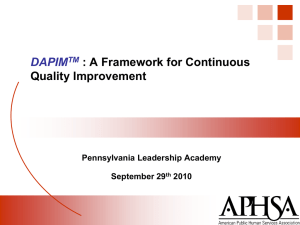World Bank Presentation: Funding
advertisement
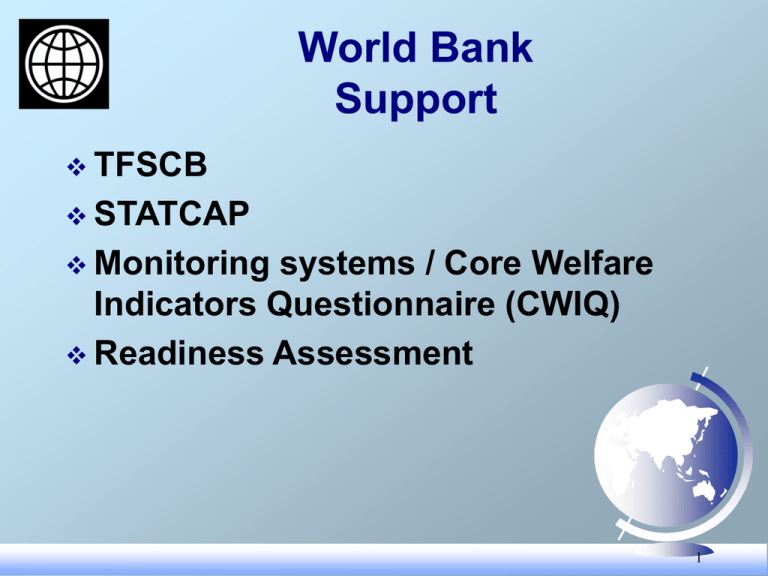
World Bank Support TFSCB STATCAP Monitoring systems / Core Welfare Indicators Questionnaire (CWIQ) Readiness Assessment 1 TFSCB Multi-donor trust fund set up in 1999 Closely coordinated with PARIS21 Goal is to help reduce poverty by strengthening the evidence-base for decision making at all levels Shared vision with PARIS21 - to develop effective and efficient national statistical systems and to promote a culture of evidence-based decision-making 2 Focus of Activities Main objective is to strengthen national statistical systems But also allows for regional and global actions where these are justified Small grants, maximum of $400,000 with a maximum implementation period of three years 3 TFSCB funded activities can be Country-specific – NSDS – Support for PRSP monitoring – Improvement in macro/or sectoral statistics; – Improvement of statistical infrastructure – Training Regional – Workshops, seminars etc, regional coordination. Global – Research, PARIS21 initiatives, etc 4 TFSCB Application Process Supervision Recipient Country Grant Agreement Country Management Unit Task Team Leader TFSCB Steering Committee TFSCB Administration Unit 5 Project Implementation Preferred model is for country implementation Statistical agencies gain experience in project management and implementation Bank implementation is allowed, but must be justified For some projects, spilt implementation has worked well 6 Some Outcomes Leverage in projects: donor funds have been matched by other resources – including scarce resources from recipients Follow-on investments: TFSCB has stimulated larger investment projects (e.g. Kenya, Burkina Faso, Nigeria) Leadership: countries are often prepared to fund activities themselves, but look to PARIS21 and TFSCB for technical guidance 7 Some Lessons Linkage of the Trust Fund with a strong global partnership is vital With small grants, need to focus on those projects which leverage further investments Need flexibility to respond to priority needs Processes need to be streamlined but must still be rigorous Need for a good advocacy strategy 8 STATCAP National statistical systems under pressure – Under-investment and a vicious cycle of poor performance and inadequate resources Need to focus on both demand and supply Need for a long-term approach But focus on results and outputs 9 How will STATCAP work? A new WB lending instrument for statistical capacity building – System wide or focused on particular areas An Adaptable Program Loan (APL), based on a sector wide approach – National projects will be phases of the APL – But projects may have several stages Designed to be a simple, user-friendly lending facility 10 How will STATCAP work? Based on a Project Appraisal Document (PAD). PAD will be based on a Statistical Master Plan (SMP) for the country The SMP will cover the entire national statistical system, even if the project is to finance SCB in only one area 11 Statistical Master Plan Based on national strategies for statistical development – Identify strengths and weaknesses, – Propose an action plan Includes – Statistical policy and the regulatory framework, management and organization – Statistical infrastructure – Statistical operations and procedures – Physical infrastructure and equipment. 12 What will StatCap finance? Improving statistical policy and regulatory framework Development of statistical infrastructure Upgrading and developing statistical operations and procedures Human resource development Investment in physical infrastructure and equipment 13 Assessing progress NSDS will set strategic objectives Each stage of country project will have specific goals and targets Make use of new assessment tools: – GDDS, DQAF and statistical capacity building indicators 14 WORLD BANK SUPPORT More information www.worldbank.org/data 15 How does a country get started? Funding – CWIQ Trust Fund – Assistance for pilot & 2 annual national surveys – Part of annual household survey prog. – Covers pilot, TA, equip., dissemination – $400,000 limit Technical Assistance – Cadre of African consultants – Two regional training centres, EASTC & ENSEA Product Development – National ‘light’ monitoring survey – Very large samples – Community of practice 16 17 Monitoring Systems Evidence based Information decision making Collection Analysis 18 Monitoring systems Lessons learnt • Institutional arrangements are the key but no blueprint • System should be simple & flexible • Build on existing processes • Ultimate goal is to feed back into policy making M & E Action Plans for National Strategies 19 Readiness Assessment To set the context for the development of M&E Action Plans for National Strategies • Incentives & Demands • Roles & responsibilities • Capacity building requirements 20 Readiness Assessment Further reading: 10 Steps to a Results-Based Monitoring & Evaluation System – Jody Kusek & Ray Rist 21
